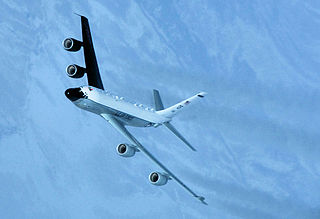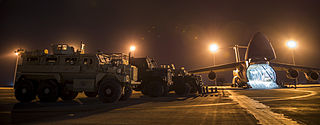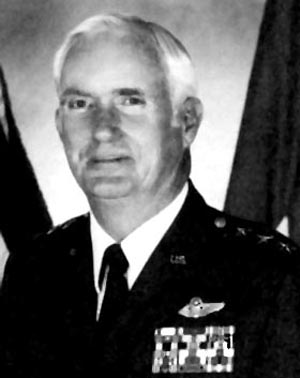
Strategic Air Command (SAC) was a United States Department of Defense Specified Command and a United States Air Force (USAF) Major Command responsible for command and control of the strategic bomber and intercontinental ballistic missile components of the United States military's strategic nuclear forces from 1946 to 1992. SAC was also responsible for the operation of strategic reconnaissance aircraft and airborne command post aircraft as well as most of the USAF's aerial refueling fleet, including aircraft from the Air Force Reserve (AFRES) and Air National Guard (ANG).

Offutt Air Force Base is a U.S. Air Force base south of Omaha, adjacent to Bellevue in Sarpy County, Nebraska. It is the headquarters of the U.S. Strategic Command (USSTRATCOM), the 557th Weather Wing, and the 55th Wing of the Air Combat Command (ACC), the latter serving as the host unit.

The Sixteenth Air Force (Air Forces Cyber) (16 AF) is a United States Air Force (USAF) organization responsible for information warfare, which encompasses intelligence gathering and analysis, surveillance, reconnaissance, cyber warfare and electronic warfare operations. Its headquarters is at Joint Base San Antonio-Lackland in Texas.

The United States Air Force Security Forces (SF) are the ground combat force and military police service of the U.S. Air Force and U.S. Space Force. The USAF Security Forces were formerly known as Military Police (MP), Air Police (AP), and Security Police (SP) at various points in their history. Due to its significant ground combat mission, Security Forces are often regarded as Air Force infantry within the Air Force and were formed on the premise of being the Air Force's "Marine Corps", in that they would provide security for the Air Force similar to how the Marines provide security for the Navy.

The 55th Wing is a United States Air Force unit assigned to Air Combat Command. The wing is primarily stationed at Offutt Air Force Base, Nebraska, but maintains one of its groups and associated squadrons at Davis-Monthan Air Force Base, Arizona, as a geographically separated unit.

The 91st Missile Wing is a United States Air Force unit assigned to the Air Force Global Strike Command Twentieth Air Force. It is stationed at Minot Air Force Base, North Dakota as a tenant unit.

The United States Air Force Honor Guard is the official ceremonial unit of the United States Air Force and is assigned to Joint Base Anacostia-Bolling, Washington D.C.

The Nebraska Air National Guard (NE ANG) is the aerial militia of the State of Nebraska, United States of America. It is, along with the Nebraska Army National Guard, an element of the Nebraska National Guard.

Major General Roger Philip Lempke is a retired United States Air Force officer and was the adjutant general (TAG) of the Nebraska National Guard. The Nebraska Adjutant General commands the state military forces and also directs the Nebraska Emergency Management Agency (NEMA). The Army National Guard in Nebraska consists of over 4,000 soldiers in 74 troop units in 28 communities throughout the state. The Nebraska Air National Guard, which is based in Lincoln, flies the KC-135R aircraft, and has unit strength of approximately 940 airmen. Approximately 30 NEMA personnel coordinate state and federal emergency planning and disaster recovery and assist local governments with training and education programs. Lempke retired effective September 2007, and was succeeded by Timothy J. Kadavy.

The 544th Intelligence, Surveillance and Reconnaissance Group is a United States Air Force unit assigned to the Air Combat Command Sixteenth Air Force. It is stationed at Buckley Space Force Base, Colorado. It was reactivated under the 70th Intelligence, Surveillance, and Reconnaissance Wing on 26 September, 2022.
The AN/FRC-117 Survivable Low Frequency Communications System (SLFCS) was a communications system designed to be able to operate, albeit at low data transfer rates, during and after a nuclear attack. The system used both very low frequency (VLF), and low frequency (LF) radio bands.

In the United States (US) Department of Defense, a beret flash is a shield-shaped embroidered cloth that is typically 2.25 in (5.72 cm) tall and 1.875 in (4.76 cm) wide with a semi–circular base that is attached to a stiffener backing of a military beret. These flashes—a British English word for a colorful cloth patch attached to military headgear—are worn over the left eye with the excess cloth of the beret shaped, folded, and pulled over the right ear giving it a distinctive appearance. The embroidered designs of the Army's beret flashes represent the heraldic colors and patterns of a unit with a unique mission or represent the history of the Army. The Air Force's beret flashes represent an Air Force specialty code (AFSC) with a unique mission. Joint beret flashes—such as those worn by the Multinational Force and Observers and the Joint Communications Support Element—are worn by all who are assigned, given their uniform regulations allow.

The 385th Air Expeditionary Group is a provisional United States Air Force unit assigned to Air Mobility Command to activate or inactivate as needed. It was last known to be stationed at Incirlik AB, Turkey. It is currently a tenant unit of the 379th Air Expeditionary Wing at Al Udeid Air Base, Qatar.

Air Force Global Strike Command (AFGSC) is a Major Command (MAJCOM) of the United States Air Force, headquartered at Barksdale Air Force Base, Louisiana. AFGSC provides combat-ready forces to conduct strategic nuclear deterrence and global strike operations in support of combatant commanders. Air Force Global Strike Command is the Air Force's service component to the United States Strategic Command (USSTRATCOM).

Troops began wearing berets as a part of the headgear of military uniforms in some European countries during the 19th century; since the mid-20th century, they have become a component of the uniforms of many armed forces throughout the world. Military berets are usually pushed to the right to free the shoulder that bears the rifle on most soldiers, but the armies of some countries, mostly within Europe, South America, and Asia, have influenced the push to the left.
Silver Creek Communications Annex was a 373.7 metres tall guyed mast used by the USAF Survivable Low Frequency Communications System Site, which was built near Silver Creek, Nebraska at 41°20′46″N97°43′18″W . Detachment 1, 33d Communications Squadron, 1st Aerospace Communications Group out of Offutt AFB, ran the site until its inactivation.

Lieutenant General E.G. "Buck" Shuler Jr. was commander of Strategic Air Command's Eighth Air Force in Barksdale Air Force Base, Louisiana. Eighth Air Force is responsible for Strategic Air Command operations in the eastern half of the United States, Europe and the Middle East. It comprises about half of SAC's long-range force of manned bombers, tankers and intercontinental ballistic missiles.
The Hobson Plan was an organizational structure established by the United States Air Force (USAF) in 1948, following experimental organization in 1947. Known as the "Wing-Base Organization," it replaced the organization used by the United States Army Air Forces (AAF), the predecessor organization of the USAF, which used separate chains of command for combat and support units. The plan made the wing the basic combat unit of the AAF, rather than the group and placed all support elements on a base under the command of the wing commander in addition to combat elements.

The ITT 465L Strategic Air Command Control System was a Cold War "Big L" network of computer and communication systems for command and control of Strategic Air Command "combat aircraft, refueling tankers, [and] ballistic missiles". International Telephone and Telegraph was the prime contractor for Project 465, and SACCS had "Cross Tell Links" between command posts at Offutt AFB, March AFB, & Barksdale AFB (SACCS also communicated with the Cheyenne Mountain Complex and Air Force command posts. The 465L System included IBM AN/FSQ-31 SAC Data Processing Systems, Remote and Simplex Remote Communication Systems, SAC Network Control Office, "4-wire, Schedule 4, Type 4B alternate voice-data operation", and one-way communication with "ICBM launch control centers" In addition to IBM for the "Super SAGE type computers", another of the 6 direct subcontractors was AT&T,

The 30th Space Communications Squadron is a United States Space Force (USSF) unit. 30 SCS is assigned to Space Launch Delta 30 at Vandenberg Space Force Base, California, under the Space Systems Command (SSC) Field Command. 30 SCS is responsible for providing cyber, communications, and mobile optics support to Space Launch Delta 30 and Vandenberg Space Force Base tenant units.






















